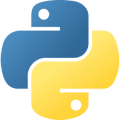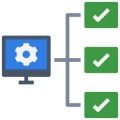Software Testing Training Institute In Pune
The Comprehensive Software Testing course is designed to provide a solid foundation in software testing principles, techniques, and best practices. Whether you are a beginner with no prior experience or an experienced professional looking to enhance your skills, this course will help you understand the fundamental concepts and practical aspects of software testing. The course covers a wide range of topics, including test planning, test design, test execution, defect tracking, and test automation.
Key Highlights
Certification
Mentor Support
100 % Job Assistance
Projects and Assignments
Interview Preparation
Hands-on Experience
Comprehensive Coverage
Flexible Learning Options
Learn Complete Software Testing
We provide instructor-led Software testing course in Pune in a conventional learning environment. Students can engage with the instructor and other students during the training, ask questions, and take part in practical activities and simulations.
Software Testing Course Overview
The “Software Testing Fundamentals” course provides a comprehensive introduction to software testing methodologies, techniques, and best practices. The course is designed for individuals interested in pursuing a career in software testing or for software developers who want to enhance their testing skills.
The course includes lectures, interactive discussions, practical exercises, and hands-on testing assignments. Students will have access to online learning materials, case studies, and testing tools. They will work individually and in groups to perform testing tasks, analyze results, and gain practical experience in software testing.
Upon completing the course, students will have a strong foundation in software testing concepts and techniques. They will be able to design and execute test cases, perform manual and automated testing, manage test environments, and report defects. Students will be equipped with the skills to contribute effectively to software testing projects and ensure the quality of software products.
There are no specific prerequisites for this course. However, a basic understanding of software development concepts and familiarity with at least one programming language will be beneficial.
Skills you'll gain
- Understanding software testing fundamentals
- Creating test plans and test cases
- Executing manual and automated tests
- Defect tracking and reporting
- Test data management
- Testing techniques, such as black-box and white-box testing
- Test automation tools and frameworks
- Performance and load testing
- Mobile and web application testing
- Agile testing methodologies.
Course Objectives
Manual
Automation
Manual Testing
Course Duration : 2 Months

• To understand what is testing?
• To understand Software development model.
• To Understand Architectures of software development.
• To learn the features of Software development models.
• To learn major concepts of the testing methodologies.
• To know different approaches to Testing.
• To understand of the types of testing.
• To plan and create test plan
• To execute the test plan.
• To create and manage test cases and defect profiles.
• To build strategies to track testing processes in the bug tracking systems.
• To do document of the test report in the testing enclosure document.
In this module you learn about Importance of testing. Why Testers need industry, software
program/application/product: meets the business and technical requirements that guided its design and
development works as expected.
• What is testing?
• Importance of testing
• Roles and Responsibilities
• Principles of software testing
• What is Quality?
• How much testing is enough?
• Differences between Manual and Automation Testing.
In this module you learn about development procedure .SDLC stands for Software development life
cycle. It is a process that describes how to develop, design and maintain the software project ensuring
that all the functional & user requirement, goals and objective are met.
1. SDLC Phases Requirements Phase.
Analysis Phase.
Design phase.
Coding Phase.
Testing phase.
Delivery and Maintenance Phase
2. SDLC Models Waterfall Model.
V Model
Agile Model.
Prototype Model.
Spiral Model.
In this module you learn about deferent types of software testing. Software Testing Methodology is
defined as strategies and testing types used to certify that the application under test meets client
expectations.
• White Box Testing.
• Black Box Testing.
• Grey Box Testing.
In this module you learn design test cases in such a way that we get the maximum coverage using an
optimal set of Test cases. Focus on highlighting the various Methods and Techniques in designing test
cases for both Black Box Testingand White Box testing.
Static Techniques:
• Informal Reviews
• Walkthroughs
• Technical Reviews
• Inspection
Dynamic Techniques:
Structural Techniques:
• Statement Coverage Testing
• Branch Coverage Testing
• Path Coverage Testing
• Conditional Coverage Testing
• Loop Coverage Testing
Black Box Techniques :
• Boundary Value Analysis
• Equivalence Class Partition
• State Transition Technique
• Cause Effective Graph
• Decision Table
• Use Case Testing
Experienced Based Techniques:
• Error guessing
• Exploratory testing
In this module you learn about levels of testing are frequently grouped by where they are added in the
software development process, or by the level of specificity of the test.
1. Functional Testing Unit Testing
• Integration Testing
• System Testing
• User Acceptance Testing.
• Sanity/Smoke Testing.
• Regression Test.
• Retest.
2. Non Functional Testing
• Performance Testing
• Memory Test
• Scalability Testing.
• Compatibility Testing.
• Security Testing.
• Cookies Testing.
• Session Testing.
• Recovery Testing.
• Installation Testing.
• Adhoc Testing.
• Risk Based Testing
• 18N Testing.
• L1ON Testing.
• Compliance Testing.
- Introduction
- Accessing Tuples
- Tuple Operations
- Functions And Methods
In this module you learn about QA & QC and How to log bugs in Project management tool, how to give severity, priority to bugs.
- What is Quality Assurance?
- What is Quality Control?
- Differences of QA & QC & Testing
- Test Management with TFS Tool (Learn & Implement)
Defect - Tracking Tools (Learn & Implement) TFS
Selenium Automation Testing
Course Duration : 100HOURS

- Basic Terminology
- Selenium Features
- Selenium Limitations
- Selenium vs QTP
- Selenium Tool Suite
- Introduction
- Selenium IDE-Installation
- Selenium IDE Download and Install
- Selenium IDE-Features
- Selenium IDE- First Test Case
- Types of Selenium Commands
- Insert Commands
- Executing the Test Script
- Locating by Identifier
- Locating by ID Element
- Locating by Name
- Locating by XPath
- Locating by CSS
- Locating by DOM
Introduction
- Download and Install Java
- Download and Configure Eclipse IDE
- Download Selenium WebDriver Java Client
- Configure Selenium WebDriver
- Selenium WebDriver- First Test Case
- Invoke Firefox browser
- Open URL:
- Scroll down through the web page in order to show the Java Technology
section
- Hard Assertion
- Soft Assertion
- Architecture of Selenium Grid
- Why Selenium Grid?
- How to set up Selenium Grid
Who can apply for the course?
The Software Testing course is specifically designed for individuals who are interested in pursuing a career in software testing or enhancing their skills in this field. It is suitable for a variety of individuals, including:
Individuals with little to no prior experience in software testing who want to start their journey in this field and gain a solid foundation in testing principles and techniques.
Students pursuing degrees or certifications in computer science, software engineering, or related fields who want to specialize in software testing and quality assurance.
Professionals already working in quality assurance or software testing roles who want to expand their knowledge and skills in testing methodologies, tools, and techniques.
Programmers or software developers who want to broaden their skill set by gaining expertise in software testing and incorporating it into their development process.
Individuals with experience in manual or automated testing in other domains (such as hardware, electronics, or mechanical systems) who want to transition into software testing.
Individuals with a strong interest in software testing, regardless of their professional background, who want to learn testing concepts, methodologies, and tools for personal projects or self-improvement.


























